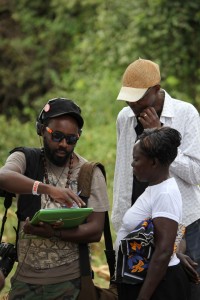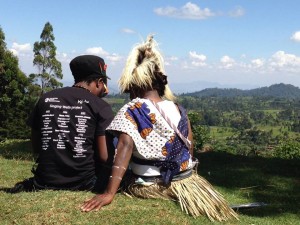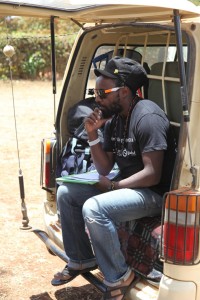As mentioned at the outset, we were joined on this trip by Gregg Tendwa, who in additional to be a development expert, was also a keen expert on the music of the Central and Eastern region of Kenya. He was in charge of interviews on the trip and did a fantastic job. We had the opportunity to interview him during our days recording in Nairobi.
SW: What was the most surprising thing about the trip?
GT: To know that this tribal music is available out in the villages. There were people singing and dancing to preserve the music – this is real life and largely in Nairobi we are cut off from the reality of real life, the soul. To still realize that it is available in its authentic format was great.
SW: What was your favourite moment on the trip?
GT : Day 3, when we recorded the Mariene Traditional Dancers: To see this group sing was to connect with real life. They weren’t singing to perform. They were singing for the sheer joy of life. When we had finished recording, they were still singing. They had such joy, because they saw how much we loved their music. As we started to drive away they formed a leading party, singing the whole time as we exited the site. It was not a performance. It wasn’t even really thanking us. It was simply their joy. It was very deep. And it made me think back to my village life. When we gathered for big celebrations, the entire village took to the road to walk for miles to a central location. We walked all night. And we sang all night. The old people walking with the children, all of us singing. And now we have a nice road that probably gets us to that site in 20 minutes by car. But what have we lost? We’ve lost the connection that comes with all generations singing together, with laughter and joy. We sang every song we knew. We sang the whole night. We were learning about our cultures and rituals as we sang but we didn’t know that. We were just singing. I was reminded on Day 3 that this is their way of life and it is pure joy. This was very deep.
SW: What most concerned you?
GT: What really concerns me is that the resources we have at singing Wells just barely lets us scratch the surface. We did 5 songs per group, but they have 100. We could have had a dozen people come on influences. We could have rehearsed performances and help the groups reach a far higher level of performance. And in every location, we could have recorded another 20 groups. It is all out there and it is all amazing but fading fast, and we are two teams in two cars chasing after it, trying to capture as much as we can. But as a Kenyan I am frightened that we are devoting so little to this. Where is the supply of talent to help us go further and deeper? Where are the funds? And where is the demand? This is not as easily digestible – there are not a lot of people ready to consume it. You have to care, you have to want to know the music.
SW: Why isn’t there more focus on this?
GT: I don’t know and it makes me angry. No offence to our partners from the Abubilla Music Foundation, but why it is that you guys needed to step in to make this happen? I’m grateful, but where were we? Why isn’t this our problem? I am concerned that the Kenyans aren’t doing it for themselves. Without AMF, we wouldn’t be able to do it. How do we turn that equation around that we as a people would find the resources to do this for ourselves? The problem is simple: things are focused on other matters that have nothing to do with the software of life, nothing to do with the soul. In that context, this music stuff is viewed as entertainment, it is a discretionary item – you don’t really need to support it.
The government is focused on politics and big money items like tourism and business is focused on marketing which demands immediate return. So on one hand, our government investing in messages that say ‘see our animals not our people.’ And business is looking for big numbers which means popular things, which sadly means easy to digest, disposable pop culture. The whole drive to “marketing” is killing our culture. If the numbers don’t come in on something than you stop it. But culture is hard to really invest in. You don’t go for the popular musicians doing the big things. You have to go to the real groups in the rural villages. And they are out there. And it gets much deeper. Our view of development is hardware – give folks roads, modernise them. But Singing Wells has discovered in fact – the best sustainable development is to keep folks rooted in their villages and the best villages are those with a vibrant musical community. This puts the soul, the software at the top of the developmental agenda. Have folks realised this?
SW: What is your advice to us?
GT: In the context of the vital importance of this, I ask myself ‘what is the future of this?’ What if there was no Abubilla Music Foundation then what happens to this project? My advice is to work hard now for sustainable funding that goes beyond one little UK charity. This is too big.
SW: Finally, what are we doing well, and what are we doing badly?
GT: You are doing a lot right. First, this is one of the best partnerships I’ve seen. The AMF is an implementation partner and has none of the ‘funder’ hang-ups I see elsewhere. Everyone digs in to get the job done. Second, you get it – it is about stories and I greatly respect the amount of time you invest The second thing is stories. You guys look out for real stories and try to tell the stories. This is really important. I think development is really about stories. And I watched out much you invest in telling the stories of these people. You care. This leads to the third thing which I wouldn’t under-estimate. You leave smiles. Folks love that you come to their village and are happy with the project – they love the attention you pay to their souls, they love the CD they get and the T Shirts and the interviews. You leave smiles. Too many projects don’t. Fourth you have stayed leaned and amazingly productive – this is one of the most accountable teams I’ve ever seen and the output you create for the resources you have is best in class.
SW: And what are we doing badly?
GT: I think you are focused very much on the actual project – doing it right. That is good. But I do worry you are missing the big picture. There is too much to do and we don’t have the resources within Singing Wells to do it. We have to think bigger. We have to find partners that will fund it beyond the limited resources of the AMF. We need to think about who would want our content and get them to pay for the right to access it. The only people I feel that would be interested partners is someone that can exploit this material and could provide royalties like producers and film makers that could really make this available. We need to think about rich Kenyans and how they can support the music of their village with our help. We need to think about corporates and get them off the popular big number kick they are on and get them to work on authentic things. You guys can get better and better at producing videos, but until we make this bigger and more sustainable, the project is always one heart attack a way from stopping. But let me end simply – this is amazing and keep it going. But let’s all start figuring out how to scale it.



